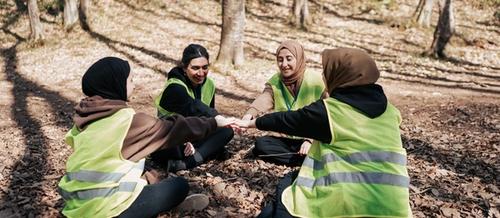
Creative embodied group supervision for therapists, clinicians and service providers
Embodied, creative and relational group supervision.

Alone we can do so little; together we can do so much.
"It's time to get another job darling".
My husband had found me sobbing on the floor after enduring the most traumatic several months of my career, in a job that I loved and had thought I would never leave.
To cut a long story short, a change in management had left me working with children who had significant histories of neglect, and physical, sexual and emotional abuse:
At the same time, my wonderful, external supervisor of eight years had had to stop work suddenly due to illness.
With all of my work-related supports gone, I was left working:
The result?
Mashed me inside a toxic systems mess.
Self care is often presented as a solution when people are exhausted, overworked, and struggling to cope.
This can look like suggestions to do less:
Or suggestions to do more:
I tried variations of the above.
Unsurprisingly, they did not solve the systemic challenges that culminated in a lack of support and governance in my workplace.
Whilst it is important for everyone to look after themselves, the push for self care alone is problematic as it lodges the problem in the individual, rather than addressing the social and systemic causes of distress.
These are structural, cultural and political issues.
The very notion of self care is problematic, as it individualises a problem that is the result of overloaded and toxic systems. Individuals not coping is a normal response to extreme pressure over a long period of time.
I think it's important to note that anyone who is struggling to cope is going to find it difficult to add extra tasks to their list.
We can all write the perfect list of all the things that we know we should do, but when we have no energy to do anything, the whole concept of self care becomes moot.
After all, it takes effort to enact tasks of care for ourselves
Although the notion of self care was borne out of the radical feminism of Audre Lorde, the core message appears to have been diluted into a ubiquitous, and at times, dismissive individualistic focus.
Further, the push for self care often comes from less altruistic purposes:
This attitude makes the solution transactional, rather than relational.
Cultural and systemic change in healthcare are essential, and whilst that is an overwhelming thought, together it is possible.
The answer lies in building ethical communities of care, accountability, belonging and support: in collective care.
Together we can push forward to empower ourselves and make small, everyday actions to hold the policy makers and politicians accountable to make systemic and cultural change in healthcare.
People not programs change people.

Creative embodied group supervision for therapists, clinicians and service providers
Embodied, creative and relational group supervision.

For too long there has been a focus on self care when we work in systems with groups of people, in community. We know that community, authentic connection and support are essential for our survival: the pandemic taught us just how vital we are for each other, and polyvagal theory confirms that the need to come together for safety and support is built into our neurobiology. So what is collective care? What does it mean? Why is it so important? Take a look below to find out more.

Conceptualising a practice of collective care in health work.
Connection, community and collaboration are essential for best outcomes in healthcare work. Drawing inspiration from thought leaders and research that advocates for a collective, compassionate and courageous response to peer support, this blog conceptualises a unique approach to collective care. How can we develop and support each other through creative expression and networks that hold us with a strong back, soft front, wild heart and clear mind for the wellbeing of our clients and our own sustainability in the work?